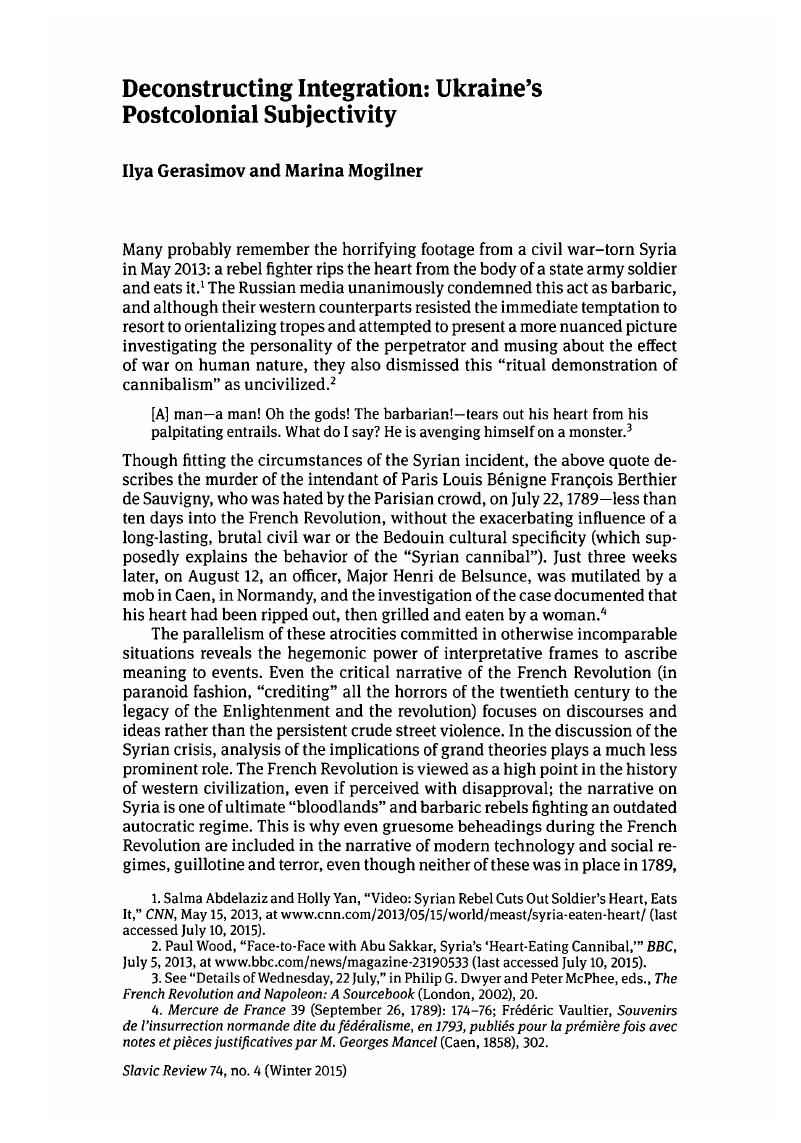Published online by Cambridge University Press: 20 January 2017

1 Salma Abdelaziz and Holly Yan, “Video: Syrian Rebel Cuts Out Soldier's Heart, Eats It,” CNN, May 15, 2013, at http://www.cnn.com/2013/05/15/world/meast/syria-eaten-heart/ (last accessed July 10,2015).
2 Paul Wood, “Face-to-Face with Abu Sakkar, Syria's ‘Heart-Eating Cannibal,'” BBC, July 5,2013, at http://www.bbc.com/news/magazine-23190533 (last accessed July 10,2015).
3 See “Details of Wednesday, 22 July, ” in Dwyer, Philip G. and McPhee, Peter, eds., The French Revolution and Napoleon: A Sourcebook (London, 2002), 20 CrossRefGoogle Scholar.
4 Mercure de France 39 (September 26, 1789): 174-76; Vaultier, Frédéric, Souvenirs de I'insurrection normande dite du fédéralisme, en 1793, publiés pour la prémière fois avec notes et pièces justificatives par M. Georges Mancel (Caen, 1858), 302 Google Scholar.
5 For the most recent example of such censorship, see Sutherland, D. M. G., “Urban Violence in 1789,” in Andres, David, ed., The Oxford Handbook of the French Revolution (Oxford, 2015), 278 Google Scholar (in passim mentioning the “ripping out [of] Berthier's heart” by an unqualified “them“) and 282 (omitting even a mention of Belsunce's mutilation).
6 Ilya Gerasimov, Sergey Glebov, and Marina Mogilner, “The Postimperial Meets the Postcolonial: Russian Historical Experience and the Postcolonial Moment,” Ab Imperio 14, no. 2 (2013): 97-135.
7 The formula was used as the title of his The Reconstruction of Nations: Poland, Ukraine, Lithuania, Belarus, 1569-1999 (New Haven, 2003).
8 Ibid., 16.
9 Prakash, Gyan, Mumbai Fables (New Delhi, 2011), esp. 29–30 Google Scholar.
10 This is how an almost-assimilated former province of Sweden developed into the semisovereign nation-state of Finland, with a constitution, parliament, laws, and economy of its own, and how the Soviet Union offered an institutional framework for the development of the nations that, after the collapse of the “Soviet empire,” separated along these institutional lines. Examples of anti-imperial rebels taking up the role of colonizers include Russian sectarian Old Believers exiled to the North Caucasus from inner Russia and revolutionary exiles pursuing evolutionist and ultimately colonialist ethnography in Siberia and the Far East.
11 Cf. Chakrabarty, Dipesh, “Subaltern Studies and Postcolonial Historiography,“ Nepantla: Views from South 1, no. 1 (2000): 9–32 Google Scholar.
12 It is important to remember that “cultural legacies are ‘transmitted'—not ‘received from.'” See Kubik, Jan, “Cultural Legacies of State Socialism: History Making and Cultural-Political Entrepreneurship in Postcommunist Poland and Russia,” in Ekiert, Grzegorz and Hanson, Stephen E., eds., Capitalism and Democracy in Central and Eastern Europe: Assessing the Legacy of Communist Rule (Cambridge, Eng., 2003), 343 Google Scholar.
13 Hrytsak, Yaroslav, “Ignorance Is Power,” Ab Imperio 15, no. 3 (2014): 218–28CrossRefGoogle Scholar.
14 “Bolee 40% ukraintsev khotiat v ES, 35%—za soiuz Putina,—opros,” Tsenzor.net, October 3, 2013, at http://censor.net.ua/n255282 (last accessed June 30, 2015).
15 “V Ukraine rekordno vyroslo chislo storonnikov evrointegratsii i protivnikov TS,— opros,” Tsenzor.net, July 4, 2014, at http://censor.net.ua/news/292570 (last accessed June 30, 2015).
16 Kulyk, Volodymyr, “Ukrainian Nationalism since the Outbreak of Euromaidan,“ Ab Imperio 15, no. 3 (2014): 94–122 CrossRefGoogle Scholar; “Interview with Viacheslav Likhachev: Maidan Will Attract Scholars Even One Hundred Years from Now,” Ab Imperio 15, no. 3 (2014): 63-74.
17 Gerasimov, Ilya, “Ukraine 2014: The First Postcolonial Revolution. Introduction to the Forum,” Ab Imperio 15, no. 3 (2014): 22–44 CrossRefGoogle Scholar.